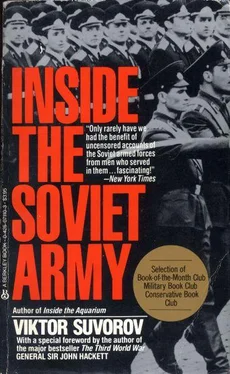Viktor Suvorov - Inside The Soviet Army
Здесь есть возможность читать онлайн «Viktor Suvorov - Inside The Soviet Army» весь текст электронной книги совершенно бесплатно (целиком полную версию без сокращений). В некоторых случаях можно слушать аудио, скачать через торрент в формате fb2 и присутствует краткое содержание. Город: New York, ISBN: , Издательство: Berkley Books, Жанр: Публицистика, на английском языке. Описание произведения, (предисловие) а так же отзывы посетителей доступны на портале библиотеки ЛибКат.
- Название:Inside The Soviet Army
- Автор:
- Издательство:Berkley Books
- Жанр:
- Год:неизвестен
- Город:New York
- ISBN:0-425-07110-3
- Рейтинг книги:4 / 5. Голосов: 1
-
Избранное:Добавить в избранное
- Отзывы:
-
Ваша оценка:
- 80
- 1
- 2
- 3
- 4
- 5
Inside The Soviet Army: краткое содержание, описание и аннотация
Предлагаем к чтению аннотацию, описание, краткое содержание или предисловие (зависит от того, что написал сам автор книги «Inside The Soviet Army»). Если вы не нашли необходимую информацию о книге — напишите в комментариях, мы постараемся отыскать её.
— The ways in which Soviet weaponry is decisively superior to the West, despite the Free World's vaunted technological superiority.
— Why the concept of “defense” is forbidden in Red Army ruling circles, and how this affects the possibility of Soviet nuclear first strike.
— The one great weakness of the Soviet armed forces the West has so far failed to exploit.
“Authentic and of great significance. One hopes that the book is being studied by the Pentagon and NATO.”
—
Inside The Soviet Army — читать онлайн бесплатно полную книгу (весь текст) целиком
Ниже представлен текст книги, разбитый по страницам. Система сохранения места последней прочитанной страницы, позволяет с удобством читать онлайн бесплатно книгу «Inside The Soviet Army», без необходимости каждый раз заново искать на чём Вы остановились. Поставьте закладку, и сможете в любой момент перейти на страницу, на которой закончили чтение.
Интервал:
Закладка:
It is said that nationalised undertakings belong to the whole community. But try sitting in the compartment of a nationalised train without a ticket-you will be made to get out and will be fined. In other words, the nationalised railways are not yours or mine or his or ours. They belong to the people who run it-in the final instance, to the government. The same applies to a nationalised newspaper. It, too, belongs to the government. In the Soviet Union all newspapers are nationalised and thus all belong to the government. Is it necessary for the government to criticise its own actions in its own newspaper? That is the reason why there is absolutely no criticism of the government in the Soviet newspapers. That is why no unqualified student would be able, nowadays, to voice criticisms of any representative of the Soviet people. On the other hand, the government has acquired excellent facilities to publish anything they wish, without risking public exposure; the whole press now belongs to it. And it is this freedom from control which allows the government and all its institutions to make daily, even hourly, use of an exceptionally powerful and effective weapon-bluff.
Soviet leaders use bluff on a large scale in international politics and they use it in masterly fashion. They employ it with particular skill in the military field: everything is secret-just try to find out what is true and what is not.
During the Cuban crisis Khrushchev threatened to reduce capitalism to ashes by pressing a button; this was at a time when Soviet rockets were still blind, having completely unreliable guidance systems, which meant that they could only be launched on strictly limited courses, otherwise no one could be sure where they would end up.
After Khrushchev all work directed at deception of the enemy was centralised. I have already mentioned the Chief Directorate for Strategic Deception, which is commanded by General N. V. Ogarkov. Here is an example of its work.
The Soviet Union had been alarming the rest of the world with its rockets for some time before the United States began to deploy a system for anti-missile defence. For the Soviet Union this American system was like a knife at its throat-because of it Soviet rockets had lost much of their power to terrorise. The USSR was quite simply unable to deploy its own similar system and it had no intention of doing so-it does not hold defensive systems in any great esteem. But it was essential somehow to stop the Americans.
So the whole Soviet (nationalised) press began saying-in unison-`We have been working on this question for a long time and we have had some success'. Then, casually, they showed the whole world some lengths of film showing one rocket destroying another. A very primitive trick. A circus clown who knows the precise trajectory characteristics of a rocket and its launch-time could hit it with an airgun. If a trick like this was shown to Soviet schoolchildren in a circus, they would not be taken in. They would know quite well that there are no miracles and that the clown must have fixed it somehow. In Western capitals, too, they knew that there are no miracles, and that until the US gave the USSR computers no system of the sort could be built there.
But the tricks continued. A gigantic rocket appeared in a Moscow parade, not in the contingent from the Strategic Rocket Forces but in that of the National Air Defence Forces-obviously, therefore, it must be an anti-ballistic missile. Finally, the USSR set about erecting a most important building-an ABM guidance station. A station of this sort built by the Americans would be fully automated, needing a team of more than a thousand, with high engineering qualifications, to run it. This station looks like the Pyramid of Cheops, although it is much larger.
They began to build it right in the outskirts of Moscow, directly on the ring-road round the capital. Let all the foreign diplomats take a good look at it. Occasionally incomprehensible high-powered signals would be transmitted by the station which careful analysis showed to be exactly the sort of signals such a station would transmit. But, inside, the building was empty, without its most essential component-a computer and command complex.
However, the dimensions of the building, the incomprehensible transmissions, the lengths of film and various dark hints dropped by Soviet generals produced the required effect. And the Soviet press provided further evidence-defence against missiles, it said, is a very expensive and not very effective business, although we are putting every effort into it. Soviet intelligence agents suddenly received orders to suspend all their efforts to acquire information on American ABM systems. The display of such disrespect for and such lack of interest in America's first-class electronic industry was calculated to indicate clearly that the Soviet Union enjoyed enormous superiority in this field. The West's nerve failed and the SALT I talks followed. At the signing ceremony the American President sat at the conference table with Brezhnev-and signed. The world sighed with relief and applauded the treaty as a victory for common sense, as a step forward taken by two giants, together.
But did the American President know that he was sitting at the table with the head of an organisation which calls itself the Communist Party of the Soviet Union? Did he know that this organisation has shot 60 million people in its own country and that it has set itself the goal of doing the same throughout the world? Not even the American Mafia could dream of doing things on this scale. When he made his quick decision to hold talks with the ringleader of the most terrible band of gangsters in the history of civilisation, did he not realise that they might simply fool him, as they would a naive schoolchild? Did he take appropriate steps against this? Were his advisers sufficiently alert?
When, next day, the Soviet newspapers published photographs of the smiling faces of the participants in the conference, the Soviet Army could not believe its eyes. Imagine: the US President with his closest advisers, Brezhnev and-right behind Brezhnev-General Ogarkov!
Unbelievable! How could such a thing happen? What were the American presidential advisers thinking of? Did they learn nothing from Pearl Harbor? Could anyone be more negligent than these people were at the signing of this treaty? Why did none of them realise that behind Brezhnev there stood not the chief ideologist, not the Politburo member responsible for scientific research, not the Politburo member responsible for the world's largest military industrial system, not the Minister of Defence, not the Chief of the General Staff, not even the Commander-in-Chief of the National Air Defence Forces, who should be in charge of the anti-missile defence system? Why was nobody there except Ogarkov, head of the Chief Directorate of Strategic Deception? This Chief Directorate is the most powerful in the Soviet General Staff. It is even more powerful than either the First or the Second Chief Directorate. Strategic Deception is that part of the General Staff which is responsible for all military censorship-for all censorship in the fields of science, technology, economics and so forth. This directorate makes a careful study of everything that is known in the West about the Soviet Union and fabricates an enormous amount of material in order to distort the true picture. This most powerful organisation supervises all military parades and any military exercises at which foreigners are to be present, it is responsible for relations with the service attaches of all foreign countries, including those with `fraternal' ties with the Soviet Union. This octopus-like organisation runs Red Star, Soviet Union, Standard Bearer, Equipment and Armament and a hundred other military newspapers and journals. The Military Publishing House of the Soviet Ministry of Defence is part of this Chief Directorate. Nothing can be published in the USSR without a permit from its head, no film can appear without one, not a single troop movement can take place without permission from the Chief Directorate, no rocket-base, no barracks-even for the troops of the KGB-can be built without its agreement, nor can a single factory, collective farm, pipe-line or railway be constructed without its prior permission. Everything in this huge country must be done in such a way that the enemy always has a false impression of what is going on. In some fields achievements are deliberately concealed; in others-as was done with antimissile defence-they are exaggerated out of all recognition. In addition, of course, representatives of the Chief Directorate, helped by Soviet military intelligence, have recruited a collection of mercenary hack journalists abroad, through which it spreads false information, disguised as serious studies. Its representatives attend negotiations concerned with detente, peace, disarmament, etc. For instance, the head of the 7th Department of the Chief Directorate, Colonel-General Trusov, is a permanent member of the Soviet delegation attending the SALT O discussions. When the stakes were at their highest, the head of the Chief Directorate, General Ogarkov himself, joined the delegation. He made a brilliant success of the operation to fool the American delegation. For this he was made Chief of the General Staff and at the same time he was promoted to Marshal of the Soviet Union. It is significant that his predecessor, Kulikov, reached the rank of Marshal only when he left the General Staff.
Читать дальшеИнтервал:
Закладка:
Похожие книги на «Inside The Soviet Army»
Представляем Вашему вниманию похожие книги на «Inside The Soviet Army» списком для выбора. Мы отобрали схожую по названию и смыслу литературу в надежде предоставить читателям больше вариантов отыскать новые, интересные, ещё непрочитанные произведения.
Обсуждение, отзывы о книге «Inside The Soviet Army» и просто собственные мнения читателей. Оставьте ваши комментарии, напишите, что Вы думаете о произведении, его смысле или главных героях. Укажите что конкретно понравилось, а что нет, и почему Вы так считаете.












